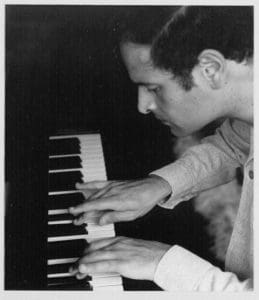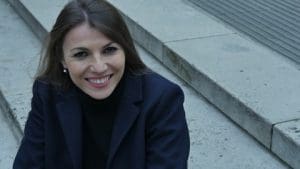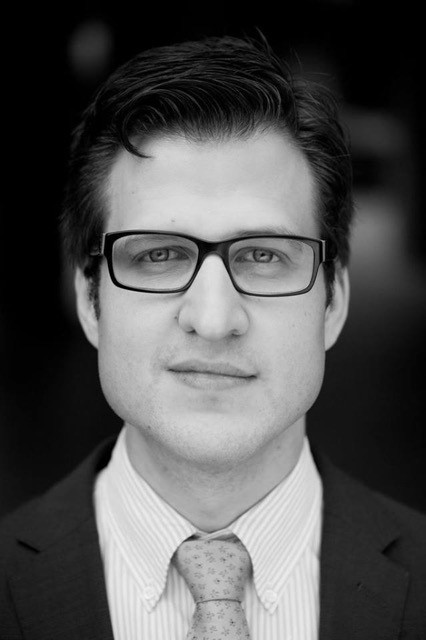
André Tchaikowsky.
André Tchaikowsky (1935-1982): The Man Behind the Skull
Polish-born British composer and pianist André Tchaikowsky never cared about having a career. Had he done that, his name would be much better known today, and he would be remembered as one of the most prominent musicians of his generation. Perhaps sadly, he is better known for bequeathing his skull to the Royal Shakespeare Company on his death in 1982 as a symbol of his love for the plays of the Bard. The skull was used on stage by the actor David Tennant in 2008 for the “Alas Poor Yorick” meditation by Hamlet on the fragility of life.
An event (details below) in London on March 24 2017 will celebrate instead the musical achievements of this enigmatic composer.
Born in Warsaw in 1935, Tchaikowsky survived World War II and the hell of the Ghetto thanks to the ingenuity of his grandmother, who at one stage kept him hidden in a stranger’s wardrobe. His mother was eventually killed at Treblinka death camp, but his father survived the war in France.

Dr Belina-Johnson.
André began his musical education immediately after the war, and success soon followed: he came third in the Queen Elizabeth Competition in 1956, which launched his international career and helped him leave Poland. Between 1957 and 1960 Tchaikowsky gave close to 500 concerts around the world, settling in England in the 1960s.
The master pianist Arthur Rubinstein was quoted as saying: “I think André Tchaikowsky is one of the finest pianists of our generation – he is even better than that – he is a wonderful musician.”
The question usually asked is, was he related to the Russian genius, Pyotr Ilyich Tchaikovsky? The truth is that he was born Robert Andrzej Krauthammer and when he was smuggled out of the ghetto in 1942 he was given the name Andrzej Czajkowski (Western spelling, André Tchaikowsky) on false identity papers.
He had a complex personality, astonishing literary talent, erudition, memory, dedication to music, and a wicked sense of humour. He once played the entire Goldberg Variations, lasting over an hour, as an encore because he wanted to ‘punish’ his audience for not being attentive enough during the concert.

Nico de Villiers.
His only opera, The Merchant of Venice, was given its world premiere at the Bregenz Festival in 2013 – a quarter of a century after his death, from colon cancer. The London premiere, sung in English, will be at the Royal Opera House on July 19 and 20 2017 and given by the Welsh National Opera.
Tchaikowsky’s researcher and biographer Dr Anastasia Belina-Johnson says that he was a brilliant pianist and a highly individual composer; he was a part of the history of the Holocaust and his story of survival is touching and sobering; he was volatile; he had a professional conflict of composer versus pianist; his sexual orientation caused him much self-doubt at various times of his life; his music is complex and moving, and forms an important part of European musical heritage.
In her talk on March 24, Dr Belina-Johnson will offer penetrating insights into his life and music. Dr Belina-Johnson edited A Musician Divided: André Tchaikowsky in his own Words (Toccata Classics, 2013). Her book draws from the musician’s diaries and from her exhaustive research in Warsaw and other locations. As far as possible, she used his own words to trace his life.
The talk will be illustrated with excerpts from the documentary film Rebel of the Keys, and the evening will conclude with a performance of Tchaikowsky’s Seven Sonnets of Shakespeare (1957), by Nico de Villiers (piano) and Rosanna Cooper (mezzo-soprano). Both performers have impressive reputations. Nico was born in South Africa where he won several prizes, has gone on to have a lauded international career, and has pursued extensive research at the Guildhall School of Music and Drama. He is celebrated as a vocal teacher and coach and has received commendation among others from soprano Barbara Bonney. He played sections of the André Tchaikowsky piano sonata in Rebel of the Keys.

Rosanna Cooper.
Rosanna, who is in advanced studies at the Royal College of Music and has given many recitals for the College and external concerts and performances, was in 2015 chosen to give what was the third public performance of the Seven Sonnets, marking the 80th anniversary of the birth of the composer.
André Tchaikowsky (1935-1982): The Man Behind the Skull. A talk by Dr Anastasia Belina-Johnson, and recital by Nico de Villiers (piano) and Rosanna Cooper (mezzo-soprano), is on March 24 2017 at 7pm at Ognisko Polskie, 55 Exhibition Road, South Kensington, London SW7. Tickets are £20 (non-members), £15 (members), £10 (students). Please see
www.ogniskopolskie.org.uk/events/andre-tchaikowsky.aspx






1 comment
Learn more from the André Tchaikowsky website:
http://andretchaikowsky.com